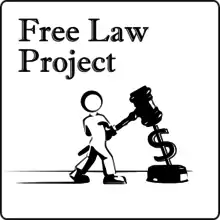Free Law Project
Free Law Project is a United States federal 501(c)(3) nonprofit that provides free access to primary legal materials, develops legal research tools, and supports academic research on legal corpora.[1] Free Law Project has several initiatives that collect and share legal information, including the largest collection of American oral argument audio,[2] daily collection of new legal opinions from 200 United States courts and administrative bodies, the RECAP Project, which collects documents from PACER, and user-generated Supreme Court citation visualizations.
 Free Law Project Logo | |
| Abbreviation | FLP |
|---|---|
| Motto | Providing Free Access to Legal Materials |
| Formation | 2013-09-24 |
| Founders | Michael Lissner, Brian Carver |
| Founded at | Emeryville, CA |
| Type | 501(c)(3) |
| 46-3342480 | |
| Registration no. | C3594588 |
Executive Director | Michael Lissner |
| Michael Lissner, Brian Carver, Thomas R. Bruce, Jerry Goldman | |
| Website | free |
Free Law Project was founded in 2013[3][4] by Michael Lissner and Brian Carver with board members Thomas R. Bruce and Jerry Goldman.[5]
Initiatives
Free Law Project has a number of initiatives, including:
- CourtListener.com, which provides a searchable and API-accessible website with court dockets, 900,000 minutes of oral argument recordings, more than eight thousand judges, and more than three million opinions. All of the opinions on CourtListener are interlinked by a citator, and the graph of citation is available via an API.
- RECAP Project, which allows users to automatically search for free copies of documents during a search in the fee-based online US legal database PACER, creating a free alternative database at the Internet Archive and CourtListener.
- Judge and Appointer Database, which provides biographical and electoral information about more than 8,000 American judges and appointors.
- Database of Reporters, which provides information about more than 400 legal reporters.
All of Free Law Project's work is open source and available online.
References
- "Free Law Project". Retrieved 2016-06-21.
- "Milestone: CourtListener has 365 Days of Continuous Oral Argument Listening". 2016-06-08. Retrieved 2016-06-21.
- "Non-Profit "Free Law Project" Formed to Create an Open Legal Ecosystem". Retrieved 2016-06-21.
- "Free Law Project provides access to legal materials and research for public". 2013-09-29. Retrieved 2016-06-21.
- "Welcoming Thomas Bruce and Jerry Goldman to our Board". 2015-07-23. Retrieved 2016-06-21.
